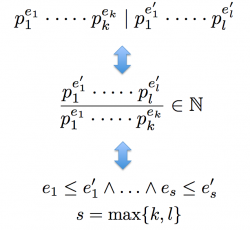Primes and divisibility
These divisors are $1$, which divides all natural numbers, and the number $n$ itself.
Anyone can easily recall some smallest prime numbers, e.g., $2,3,5,7,11,13,17$ etc. Although in general, determining whether a given (large) number is prime can be a very resource consuming. Also, the location of primes among integers can not be easily computed, however there are many interesting patters, see e.g. Ulam spiral and Prime number theorem.
Show that the set of prima numbers is infinite.
Hint. Start by assuming that the set of prime numbers is finite, for example $\{p_1,\ldots,p_n\}$.
Note that $1$ is not considered a prime number nor a composite number as it only has one divisor.
In a way, the prime numbers are the ``building blocks'' of all natural numbers (see the following theorem).
Unique factorization theorem. Any natural number $n$ can be represented in exactly one way as a product of prime numbers: $$n = p_1^{e_1} \cdot p_2^{e_2}\cdot \dots \cdot p_k^{e_k} = \prod_{i=1}^k p_i^{e_i},$$ where $p_k$ is the largest prime number that divides $n$ and $e_i \in\mathbb{N}\cup\{ 0\}$ for all $i\in\{1,\dots,k\}$.
Here we denote $p_1 = 2$, $p_2 = 3$, $p_3 = 5$, $p_4 = 7$, $p_5 = 11$, etc. Thus, $p_i$ denote the i-th prime number. For any $i$, the integer $e_i$ is called the index of $n$ at $p_i$.
Some examples of the prime factorization:
$30=2^1 \cdot 3^1 \cdot 5^1$,
$24=2^3 \cdot 3^1$,
$3675=2^0 \cdot 3^1 \cdot 5^2 \cdot 7^2 $.
Note that there can be primes $p_i$ which do not divide $n$ and thus their power $e_i=0$ written to the end of the prime factorisation if needed.
Find the prime factorisations of $4$, $36$, $720$.
The prime factorisations are very tightly related to the divisibility relation.
Given two natural numbers $n$ and $m$ as their prime factorizations $n = p_1^{e_1}\cdot\dots\cdot p_k^{e_k}$ and $m = p_1^{e'_1}\cdot\dots\cdot p_l^{e'_l}$, it is clear that $n \mid m$ if and only if $e_i \leq e'_i$ for all $i \in \{1,\dots,\max\{k,l\}\}$.
For example, $24\not\mid 30$, where
$24=2^{\color{blue}3} \cdot 3^{\color{blue}1}$,
$30=2^{\color{red}1} \cdot 3^{\color{red}1} \cdot 5^{\color{red}1}$,
since for the prime $2$ the required relation between the powers does not hold
| primes | $2$ | $3$ | $5$ |
|---|---|---|---|
| relation betveen powers | $\color{blue}3\not\leq \color{red}1$ | $\color{blue}1\leq \color{red}1$ | $\color{blue}0\leq \color{red}1$ |
However, $10\mid 30$, where
$10=2^{\color{blue}1} \cdot 3^{\color{blue}0}\cdot 5^{\color{blue}1}$,
$30=2^{\color{red}1} \cdot 3^{\color{red}1} \cdot 5^{\color{red}1}$,
since
| primes | $2$ | $3$ | $5$ |
|---|---|---|---|
| relation betveen powers | $\color{blue}1\leq \color{red}1$ | $\color{blue}0\leq \color{red}1$ | $\color{blue}1\leq \color{red}1$ |
Use prime factorisation to verify $465 \mid 6975$.
This relation between the prime factorisation and divisibility can be used for calculating the greatest common divisor and the least common multiple.

